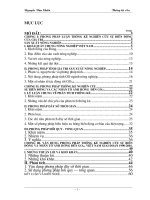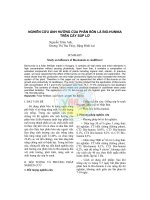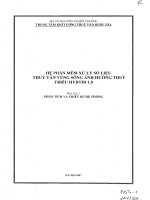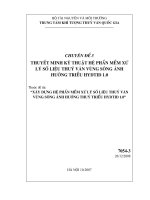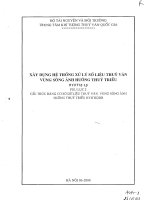Ảnh hưởng của tiếng mẹ đẻ đến phát âm Tiếng Anh của sinh viên năm thứ nhất trường Đại học Kỹ thuật Công nghiệp Thái Nguyên = AThe interference of the mother ton
Bạn đang xem bản rút gọn của tài liệu. Xem và tải ngay bản đầy đủ của tài liệu tại đây (725.04 KB, 43 trang )
VIETNAM NATIONAL UNIVERSITY, HANOI
UNIVERSITY OF LANGUAGES AND INTERNATIONAL STUDIES
FACULTY OF POST-GRADUATE STUDIES
*********************
HONG TH THÊM
THE INTERFERENCE OF THE MOTHER TONGUE IN THE FIRST YEAR
STUDENTS’ ENGLISH PRONUNCIATION AT THAI NGUYEN
UNIVERSITY OF TECHNOLOGY
nh hưng ca ting m đ đn pht âm Ting Anh ca sinh viên năm th
nhâ
́
t Trươ
̀
ng Đa
̣
i ho
̣
c Ky
̃
thuâ
̣
t Công nghiê
̣
p Tha
́
i Nguyên
M.A MINOR PROGRAMME THESIS
FIELD: ENGLISH TEACHING METHODOLOGY
CODE: 60140111
Hanoi, 2014
VIETNAM NATIONAL UNIVERSITY, HANOI
UNIVERSITY OF LANGUAGES AND INTERNATIONAL STUDIES
FACULTY OF POST-GRADUATE STUDIES
*********************
HONG TH THÊM
THE INTERFERENCE OF THE MOTHER TONGUE IN THE FIRST YEAR
STUDENTS’ ENGLISH PRONUNCIATION AT THAI NGUYEN
UNIVERSITY OF TECHNOLOGY
nh hưng ca ting m đ đn pht âm Ting Anh ca sinh viên năm th
nhâ
́
t Trươ
̀
ng Đa
̣
i ho
̣
c Ky
̃
thuâ
̣
t Công nghiê
̣
p Tha
́
i Nguyên
M.A MINOR PROGRAMME THESIS
FIELD: ENGLISH TEACHING METHODOLOGY
CODE: 60140111
SUPERVISOR: H CM TÂM, PhD.
Hanoi, 2014
i
DECLARATION
***
I, Hoàng Thị Thêm, hereby certify that this minor thesis entitled
THE INFLUENCE OF THE MOTHER TONGUE ON THE FIRST YEAR
STUDENTS’ ENGLISH PRONUNCIATION AT THAI NGUYEN
UNIVERSITY OF TECHNOLOGY
is completely the result of my own word for the Degree of Master at University of
Languages and International Studies, Vietnam National University, Hanoi and that
this thesis has not been submitted for any degree at any other university or
institution.
Signature
Hong Th Thêm
ii
ACKNOWLEDGEMENTS
This thesis could not have been accomplished without the help,
encouragement and support of many people who all deserve my sincerest gratitude
and appreciation.
First and foremost, I would like to express my deepest gratitude to my
supervisor, Dr Hà Cẩm Tâm, for her priceless support, wholehearted guidance, and
timely encouragement during the time I conducted this research.
I am also grateful to all the lecturers at the Department of Post-graduate
Studies, College of Foreign Languages, Vietnam National University, Hanoi whose
support and considerations have enabled me to pursue the course.
I would also like to send my thanks to all my colleagues who have helped me
a lot in creating good conditions in teaching and helping me with their experiences
during my thesis.
My special thanks also go to the students from two classes 49J1 and 49H for
their whole-heated participation in the study.
Finally, I owe a great debt of gratitude to my beloved family – my parents,
my husband, my children, whose support and encouragement has always been a
great deal of strength that has helped me a lot to overcome all problems to complete
this thesis.
iii
ABSTRACT
The research in this minor thesis was carried out to investigate whether the
mother tongue influences students‟ English pronunciation at Thai Nguyen
University of Technology. It sought the answers to the following questions:
1. What are pronunciation mistakes made by students at Thai Nguyen
University of Technology?
2. Are they caused by mother tongue influences?
The study was conducted with two classes (49J1, 49H) consisting of 100
students in their second term. The data of the study were obtained using 2 research
instruments: class observation and recording. After that the data was analyzed and
the findings of the research revealed that Vietnamese has influences on the first year
students‟ English pronunciation at Thai Nguyen University of Technology. At the
end of the research, the researcher proposed some suggestions to improve students‟
pronunciation.
iv
LIST OF TABLES AND FIGURES
TABLES Page
Table 1: Mistakes observed in the class and recorded in the oral test 17
Table 2: Mistakes by participants 18
v
TABLE OF CONTENTS
Page
Declaration i
Acknowledgements ii
Abstract iii
List of tables and figures iv
Table of Contents v
Part A: Introduction 1
1. Rationale of the study 2
2. Objectives of the study 2
3. Research questions of the study 2
4. Scope of the study 2
5. Methods of the study 2
6. Organization of the study 2
Part B: Development 4
Chapter 1: Literature review 4
1.1. The interference of the mother tongue in foreign languages 4
1.1.1. Definition of the mother tongue and foreign languages. 4
1.1.2. The interference of the mother tongue in foreign languages 4
1.2. English pronunciation 5
1.2.1 English consonants 5
1.2.2 English vowels 10
1.2.3 Consonants clusters 12
1.3 Vietnamese pronunciation 12
1.3.1. Vietnamese consonants 12
1.3.2 Vietnamese vowels 13
1.4. Review of Previous studies 13
Chapter 2: The study 15
2.1 Methodology 15
vi
2.1.1 Setting of the study 15
2.1.2 Participants 15
2.1.3 Data collection instruments 15
2.1.3.1 Class Observation 15
2.1.3.2 Recording 16
2.1.4 Data collection procedures 16
2.2. Findings and discussion 17
2.2.1. Description on the three most frequent types of mistakes 17
2.2.2. Data analysis and discussion 19
2.2.2.1. Mistakes in omission of sounds 19
2.2.2.2. Mistakes in sound replacement 20
2.2.2.3. Mistakes in consonant clusters 24
Part C: Conclusion 26
1.Major findings of the study 26
2.Implications 26
3. Limitations of the study 28
4. Suggestions for further study 28
REFERENCES 29
APPENDICES I
1
PART A: INTRODUCTION
1. Rationale of the study
Language plays a very important role in communication. People all over the world
can communicate with each other by speech or writing that are the two primary modes of
linguistic communication.
In a speech communication situation, a speaker always tries to make him/ her
understood and interested. What makes people understood and interested in one‟s English
is firstly his/ her pronunciation. Pronunciation is definitely the biggest thing that people
notice when you are speaking English. A person can express his idea with simple words
and simple grammar, but there is no such thing as simple pronunciation.
Learning a language consists of learning its vocabulary, grammar and
pronunciation. Learners with good pronunciation are likely to be understood even if they
make mistakes in other area, whereas learners with bad pronunciation will not be
understood, even if their grammar is perfect.
In fact, pronunciation is becoming increasingly recognized as a crucial area for
language learners (Celce-Murcia et al, 1996).
All learners know the importance of pronunciation. However, they find it difficult
to acquire an accent which is intelligible. One of those difficulties is caused by the
interference of their mother tongue in their language learning because each language has
its own rules and phonetic system which may cause a lot of obstacles to learners in
practising and performing them correctly.
In their book, Avery and Ehrlich (1992) show the reason why speakers of English
are able to recognize Spanish accents, Russian accents, Chinese accents … That is because
the nature of a foreign accent is determined to a large extent by a learner‟s native language.
Like any learners of English, Vietnamese learners are coping with so many
difficulties in pronouncing English because of the mother tongue interference. Vietnamese
and English differ a great deal, but Vietnamese students often transfer sound patterns of
Vietnamese into English, that makes their pronunciation imperfect and unintelligible.
As a teacher of English, I can see mistakes that students at TNUT have made in
producing sounds. Therefore, I would like to conduct this research to point out how
Vietnamese affects students‟ English pronunciation and make some corresponding
improvements. Those are the reasons why I decide to do a research entitled: “The
2
interference of the mother tongue in the first year students‟ English pronunciation at Thai
Nguyen University of Technology.”
2. Objectives of the study
The objectives of this study are stated as follows:
- To discover pronunciation mistakes made by students at Thai Nguyen University of
Technology.
- To investigate whether the causes of the mistakes come from students‟ mother
tongue.
3. Research questions of the study:
To achieve the aims mentioned above, this study tries to answer the following
questions:
1. What are pronunciation mistakes made by students at Thai Nguyen University of
Technology?
2. Are they caused by mother tongue influences?
4. Scope of the study
The study was carried out with two classes (49J1, 49H) comprising 100 students in
their second term, the academic year 2013-2014.
In this thesis, the interference of the mother tongue in pronunciation is dealt with,
but the study cannot cover all the problems related to pronunciation, this study only
focuses on the mother tongue interference in producing English sounds.
5. Methods of the study
A combination of different data collection methods were used including
recording students‟ pronunciation in an oral test, observing their performance in class
and note-taking.
6. Organization of the study
The thesis consists of three parts: introduction, development with three chapters
and conclusion.
Part A: Introduction presents the rationale, aims, research questions, and
organization of the study.
Part B: Development includes three main chapters.
Chapter 1 Literature review provides a brief literature review relevant to the study.
In this chapter, section 1 discusses the interference of the mother tongue in foreign
3
languages, section 2 presents some aspects of English pronunciation , section 3 discusses
Vietnamese pronunciation and section 4 reviews previous studies
Chapter 2 The study consists of two sections: section 1 presents methodology,
section 2 displays findings and discussion.
Part C: Conclusion summarizes the major findings with reference to the research
questions mentioned in Part A. This part also includes implications to improve students‟
pronunciation, limitations of the study and suggestions for further study.
4
PART B: DEVELOPMENT
CHAPTER 1: LITERATURE REVIEW
This chapter, literature review, presents a review of related literature that provides
the theoretical background of the study. It includes three main sections. The first section
mentions the interference of the mother tongue in foreign languages, and then an overview
on English pronunciation and Vietnamese pronunciation are presented respectively in
section 2 and section 3.
1.1. The interference of the mother tongue in foreign languages
1.1.1. Definition of the mother tongue and foreign languages.
A first language (also native language, mother tongue, arterial language, or L1) is
the language(s) a person has learned from birth or within the critical period, or that a
person speaks the best and so is often the basis for sociolinguistic identity.
Richards and Platt (1992) define the mother tongue as follows: “a first language
which is acquired at home.” They also indicate that the first language is a person‟s mother
tongue or the language acquired first. Often this term is used synonymously with the native
language.
The first language is the language through which the child makes acquaintance with
everything about it to communicate. Mostly it may be their mother tongue.
A foreign language is a language which is not a native language in a country. A
foreign language is usually studied either for communication with foreigners who speak
the language, or for reading printed materials in the language (Richards and Platt, 1992).
A foreign language is a language indigenous to another country. It is also a
language not spoken in the native country of the person referred to, i.e., an English speaker
living in Japan can say that Japanese is a foreign language to him or her. These two
characterisations do not exhaust the possible definitions, however, and the label is
occasionally applied in ways that are variously misleading or factually inaccurate.
1.1.2. The interference of the mother tongue in foreign languages
Mother tongue interference is defined as the use of elements from one‟s native
language while learning the second language. Mother tongue interference is one of the
causes of mistakes.
When we learn a foreign language, we often make mistakes in grammar,
pronunciation, and vocabulary caused by our first language. “The sound system
5
(phonology) and the grammar of the first language impose themselves on the new language
and this leads to a „foreign‟ pronunciation, faulty grammatical patterns and, occasionally,
to the wrong choice of vocabulary.” (Hubbard et al, 1983, p140).
Most linguists would probably agree that the mother tongue can affect learners‟
English in several ways. Pronunciation, vocabulary, syntax, discourse structure,
handwriting and all other aspects of language use are likely to some extent to carry a
mother-tongue accent. But the most striking is in the case of pronunciation where the
phonological structure of a speaker‟s first language and the associated articulatory setting
of the lips, tongue, jaw, etc. usually his or her English speech quite strongly (Swan and
Smith, 1987).
In fact, the mother tongue plays an important factor in learning to pronounce
English. In his book, KenWorthy (1987) emphasizes the role of the mother tongue by
indicating the fact that a foreign accent has some of the sound characteristics of the
learner‟s native language.
Avery and Ehrlich (1992) point out that the sound system of the native language
can be seen to influence our students‟ pronunciation of English. According to them,
students‟ pronunciation of English is influenced in at least three ways. First, difficulties
may arise when a learner encounters sounds in English that are not part of the sound
inventory of the learner‟s native language. Secondly, difficulties may arise because the
rules for combining sounds into words are different in the learner‟s native language.
Thirdly, the patterns of stress and intonation, which determine the overall rhythm and
melody of a language, can be transferred from the native language into the second
language.
They also state that the native language not only affects the ability to produce
English sounds but also the ability to hear English sounds.
1.2. English pronunciation
This section does not focus on all aspects of English pronunciation. It only deals
with English consonants, vowels, consonant clusters and sound linking.
1.2.1. English consonants
In English there are twenty-four consonants illustrated in the following chart.
